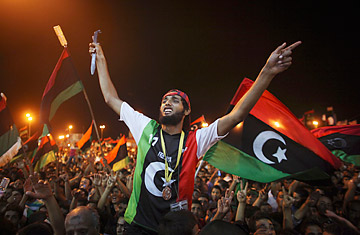
A crowd in Benghazi, Libya, celebrates on Aug. 22, 2011, the news that Muammar Gaddafi's government is collapsing
U.S. President Barack Obama:
Tonight, the momentum against the Gaddafi regime has reached a tipping point. Tripoli is slipping from the grasp of a tyrant.
The surest way for the bloodshed to end is simple: Muammar Gaddafi and his regime need to recognize that their rule has come to an end. Gaddafi needs to acknowledge the reality that he no longer controls Libya. He needs to relinquish power once and for all.
Meanwhile, the United States has recognized the Transitional National Council as the legitimate governing authority in Libya.
At this pivotal and historic time, the TNC should continue to demonstrate the leadership that is necessary to steer the country through a transition by respecting the rights of the people of Libya, avoiding civilian casualties, protecting the institutions of the Libyan state and pursuing a transition to democracy that is just and inclusive for all of the people of Libya. A season of conflict must lead to one of peace.
U.K. Prime Minister David Cameron:
It is clear from the scenes we are witnessing in Tripoli that the end is near for Gaddafi.
He has committed appalling crimes against the people of Libya, and he must go now to avoid any further suffering for his own people.
French President Nicolas Sarkozy
Whereas there is no longer any doubt [that Gaddafi will have to go], the President of the Republic urges Colonel Gaddafi to avoid inflicting new futile sufferings on his people in abandoning what is left of his power and in immediately calling on his forces, who are still loyal to him, to a cease-fire, to drop their weapons, to go back to their barracks and to put at its disposal legitimate Libyan authorities.
NATO Secretary-General Anders Fogh Rasmussen:
The Libyan people have suffered tremendously under Gaddafi's rule for over four decades. Now they have a chance for a new beginning.
Now is the time for all threats against civilians to stop, as the United Nations Security Council demanded. Now is the time to create a new Libya — a state based on freedom, not fear; democracy, not dictatorship; the will of the many, not the whims of a few.
That transition must come peacefully. It must come now. And it must be led and defined by the Libyan people.
Australian Prime Minister Julia Gillard:
We continue to call on Colonel Gaddafi to get out of the way, and of course we believe he should face the international charges that are against him.
We will as a nation continue to support the people of Libya on what we want to see as a journey to peace and democracy.
Italian Foreign Minister Franco Frattini:
The only route that Gaddafi should follow is that of giving himself up.
The regime should name two authoritative figures that are not stained with blood crimes [to enact the transition].
Venezuelan President Hugo Chávez:
Today we are seeing images of how the democratic European governments — well, some of them are [democratic] — are practically demolishing Tripoli with their bombs and the supposedly democratic government of the United States, because they feel like it.
Today they dropped I-don't-know-how-many bombs, and they are dropping them indiscriminately and openly ... over schools, hospitals, houses, businesses, factories, farms. And we call on God to bring peace of the Libyan people and the people of the world.
Hamas spokesman Sami Abu Zuhri:
Hamas welcomes the entry by Libyan revolution fighters into the capital, Tripoli, and congratulates them on this great victory.
We hope this will represent a turning point in the history of Libya towards progress and prosperity in implementing the will of the Libyan people.
Catherine Ashton, High Representative of the European Union for Foreign Affairs:
We are witnessing the last moments of the Gaddafi regime. I call on Gaddafi to step down without further delay and avoid further bloodshed. I call on the National Transitional Council and opposition forces to ensure the protection of civilians, to fully respect international human rights and humanitarian law and to act with responsibility in the interests of maintaining peace and stability throughout the country.
Chinese Foreign Ministry spokesman Ma Zhaoxu:
We've noticed the development in Libya. China respects the choice of Libyan people. China hopes the situation in Libya gets stabilized as soon as possible and people can live a normal life there. China is willing to cooperate with the international society to play a positive role in the future reconstruction of Libya.
Clayson Monyela, South African spokesman for the Department of International Relations:
With the imminent fall of the government of Colonel Gaddafi, we wish to urge the interim authority in Tripoli to immediately institute an all-inclusive inter-Libyan political dialogue aimed at building a truly representative and people-centered dispensation." (The spokesman refuted "rumors and claims that it has sent planes to Libya" to fly Gaddafi and his family out, saying, "We have steadfastly maintained that the future of Libya should be decided by the Libyans themselves.)
